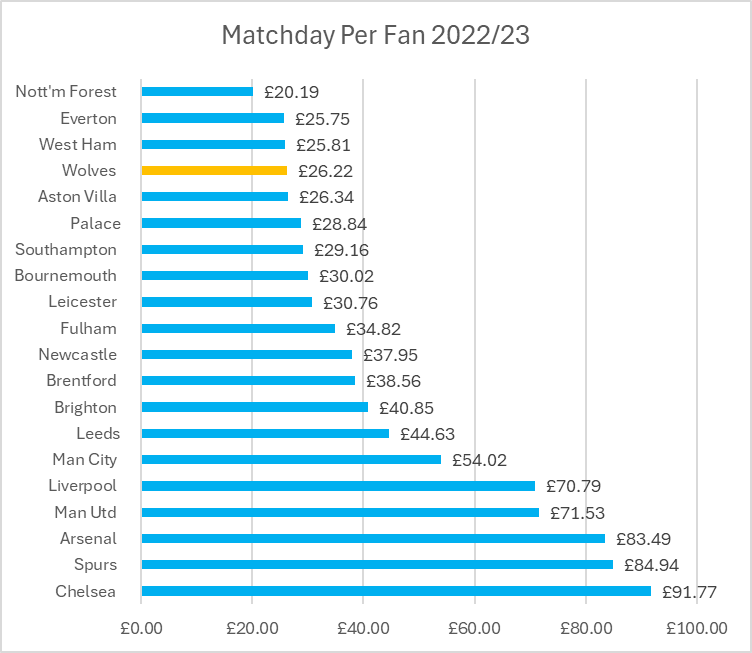WATCH OUR EXCLUSIVE INTERVIEW WITH FOOTBALL FINANCE EXPERT KIERAN MAGUIRE TALKING WOLVES, FOSUN & PREMIER LEAGUE
Wolves’ Future Under Fosun: Are We Heading for a Sale or a New Era?
Wolves fans have been on a rollercoaster since Fosun’s takeover in 2016, from euphoric highs to some recent low points. The recent news of Fosun buying back shares from Peak6 has stirred a lot of speculation within the Molineux faithful: could this be signalling an impending sale? Or is it just business as usual? To get to the heart of this, we talked to football finance specialist Kieran Maguire, known for his deep understanding of football economics and co-host of the Price of Football podcast.
Let’s break down everything pointing to where Wolves stand financially and what it all means for the club’s future.
The Bigger Picture Behind the Peak6 Buyback
Fosun has just bought back an 8% stake from Peak6 for around £38 million, placing the total valuation of the club at roughly £480 million. Does this mean Wolves are up for grabs?
According to Maguire, buying back shares could hint at preparedness for a future sale, but that doesn’t mean there’s a “For Sale” sign out just yet. Owners often buy back shares to make the club more attractive to potential buyers who prefer owning 100% outright. It also smooths any potential takeover deals as there’s no longer a need to negotiate with minority shareholders. However, this kind of buyback can happen for many reasons, and it’s not always about selling up.
If you’re ever wondering why it matters: buying a “clean” club is much less hassle for buyers—a bit like making sure your house is empty of tenants before selling it. All in all, Fosun has tidied up any potential hurdles for future buyers if they’re open to offers.
Have Fosun Lost Interest?
When Fosun initially invested, Wolves were in the Championship. Fast-forward to 2018 and Wolves were promoted to the Premier League, finishing 7th in their first season back and even reaching the Europa League quarter-finals in 2020. It seemed everything was aligned for Wolves to push on towards the Champions League.
But since then, fans have noticed what feels like the brakes being applied, especially in terms of spending. Gary O’Neil’s current squad is dug deep in the relegation battle, which has led many to question whether Fosun is still as engaged as they once were. Maguire says it could be a shift in strategy. Wolves did spend big when they first returned to the Premier League, making some impactful signings like Raúl Jiménez and Rúben Neves. However, not every signing has paid off, and there’s no denying that some key players have misfired—think Fabio Silva, who never lived up to his hefty price tag.
The reality is that a lot has changed in China’s political and economic landscape too. Maguire points out that Fosun’s initial mission was bolstered by the Chinese government’s push for investment in football, but that has since cooled off. Fosun’s priorities seem to have shifted, and Wolves may no longer be front and centre on their agenda.
Investment Drying Up in Critical Areas
Wolves fans aren’t only concerned about performance on the pitch; there’s been a lot of grumbling about the lack of investment in the infrastructure. The Steve Bull stand has been crying out for refurbishment for years, and the promised stadium expansions have never materialised.
If you look at other clubs pushing for Premier League growth, many are doubling down on expanding their capacity. Spurs’ new stadium is a perfect example, as is Everton’s projected move to Bramley-Moore Dock. Maguire says the reason for Wolves hesitating could be simple: the numbers might not stack up. Unlike big London clubs or those located in tourist-heavy cities, Wolves don’t necessarily have the draw to fill larger stadiums week in and week out with casual or international fans. Consequently, the return on investment might not be as significant, especially when you factor in the rising cost of materials, such as steel for construction.
Profitability vs. Spending: How Wolves Are Navigating PSR
A key reason why Wolves aren’t splashing the cash like they did during earlier windows is down to Premier League financial regulations, namely Profit and Sustainability (PSR) rules. After a hefty £212 million spend in the 2022/23 season alone, the club has had to rein in its spending.
Maguire explains that Wolves weren’t on the Premier League “watchlist” for clubs nearly hitting the financial ceiling, but they are mindful of staying compliant. Over the past few seasons, key players like Rúben Neves and Matheus Nunes have been sold off to shore up finances. However, this is a balancing act—if the club doesn’t invest enough in fresh talent, stagnation can lead Wolves slipping further down the table. It’s like walking a tightrope: spend too much and violate PSR, spend too little and face the risk of relegation.
The good news, at least for now, is that Wolves seem to have a bit more room to manoeuvre on the spending front next year.
How Does the Esports and Fashion Involvement Benefit Wolves?
Fosun hasn’t just dished out cash on the football side of things. They’ve also diversified Wolves’ brand—think the investment in Esports teams, music ventures, and their recent involvement in the Sudu sportswear brand.
But what does all this mean for you as a fan? It’s easy to brush this off as irrelevant to the matchday experience, but Maguire breaks it down simply: any extra revenue stream is a good thing. The traditional sources—tickets, broadcasting, and sponsorship—can only grow so much, so diversifying income sources might help, even if only a little.
However, it’s about numbers. While things like Esports can help with sponsorship deals and additional attention, they’re unlikely to move the needle compared to more traditional revenue streams or major sponsorship deals. So, while it’s nice to see the club innovating, don’t expect these ventures to singlehandedly transform the overall budget.
The Controversial Season Ticket Price Hike
Wolves have also faced backlash for a significant 17% hike in season ticket prices this year. English football has always been a working-class sport, but things are changing fast, and fans are rightfully worried about being priced out.
Wolves were among the Premier League clubs with the lowest matchday revenue in 2022/23. Yes, you read that right. Clubs like Fulham, Leicester, and Bournemouth all generated more revenue per fan, leading to an understandable—albeit frustrating—decision by Wolves to raise ticket prices this season, averaging a 17% increase.
Kieran sheds light on why this has happened. As TV money has plateaued and sponsorships become less reliable (particularly due to gambling sponsorship regulations), clubs are increasingly turning to ticket sales to stay afloat. Wolves are benchmarking their matchday revenues against clubs of a similar profile, but for local fans, it still feels like a big ask in a tough economy.
The reality is that football isn’t just a game anymore—it’s big business. While the cost increase may seem steep, it reflects the growing pressures on clubs to maximise every revenue stream to remain competitive.

Are Wolves Up for Sale?
This is the burning question every Wolves fan wants an answer to: are Fosun looking to sell?
According to Kieran Maguire, the club isn’t actively being marketed for sale, but it’s also not being held too tightly. Fosun likely wouldn’t say no to a compelling offer, particularly if it allows them to walk away with a tidy profit. However, they’re not desperate to offload the club. Instead, they’re sitting back, seeing if anyone comes knocking with the right figure.
With a current valuation of around £480 million, a prospective buyer would need to be ready to take on a significant financial commitment, especially given the potential risk of relegation looming.
The Price of Relegation
What happens if Wolves get relegated from the Premier League?
The financial drop is drastic. Currently sitting near the bottom of the table, Wolves face the prospect of losing a significant chunk of TV revenue, which is their biggest income stream. Kieran broke it down like this:
- Premier League TV revenue: £110 million
- Championship TV revenue (with parachute payments): £49 million
That’s a near £60 million hit right there—before we even factor in decreased sponsorships and matchday revenues. Players would likely be sold, which could offset some of the losses, but the club’s financial operation would need thorough rethinking.
The real question is whether Fosun would want to stick around in the Championship. The relegation stakes could well determine the club’s future under their ownership.
Conclusion
Wolves’ future under Fosun remains an intriguing chapter in the club’s history. While it’s clear Fosun’s early enthusiasm has waned and they would entertain an exit if the right buyer came along, the club isn’t on the chopping block just yet. Whether Wolves can navigate through the challenges of reduced investment, rising ticket costs, and tough Premier League competition will determine the trajectory for the next few seasons. But for now, all eyes are on the pitch and the boardroom.
If you’re a Wolves fan, be prepared: the ride might just be getting started.
What do you make of Wolves’ current situation and Fosun’s role in it? Let us know your thoughts in the comments below!



